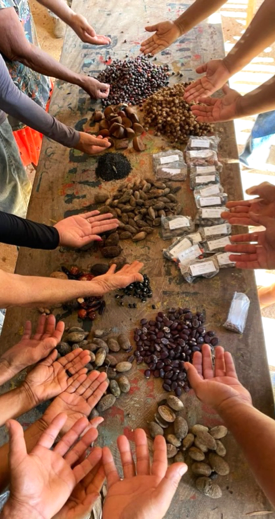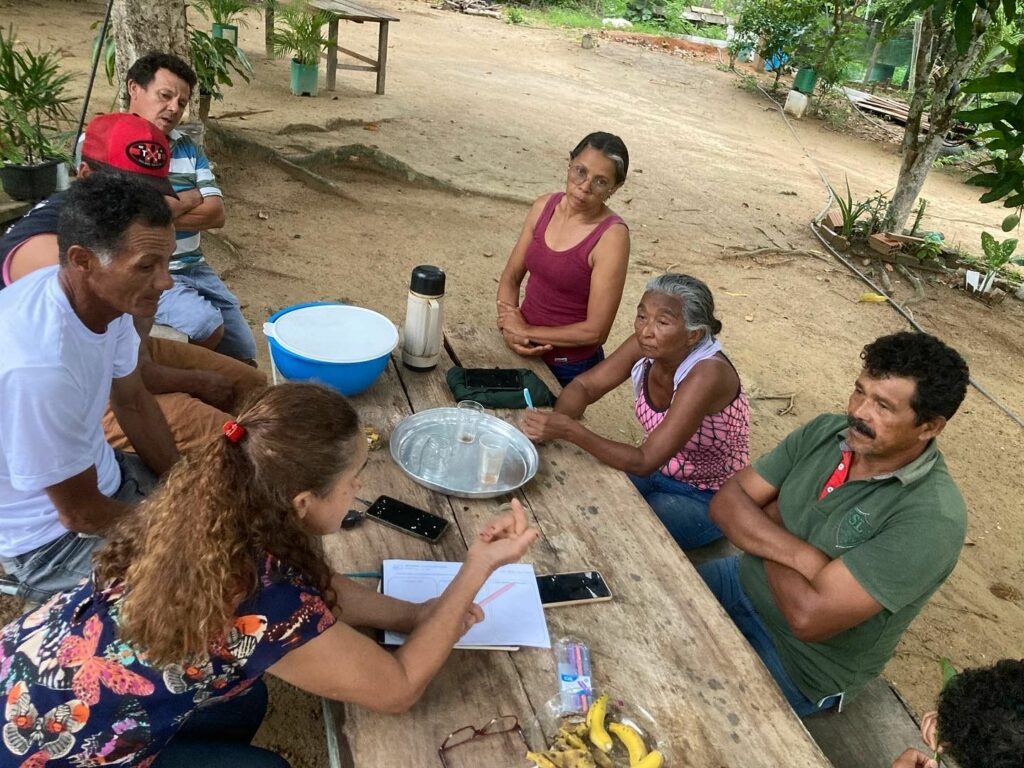We’ve been on an amazing journey during our first two years.
We invite you to look back on what we’ve learned, done and what we’ll do next.
Leia em Português.
- Impact Network, working together we strengthen each other
- Deep Listening, the base of our work
- Regenerative Agriculture to restore land while empowering its people
- Meliponiculture, our inspiration putting into practice
- Technology, P2P, decentralised tools and safe data
- International Awareness for effective international cooperation
- Work in progress: Pollinating Regeneration, community empowerment starts with their own ideas
- Acknowledgements
Impact Network,
working together we strengthen each other
We know we can do more when we trust each other, respect each other and work together.

Our first Regenerative Agriculture Workshop at Frei Henri is a great example. Participants brought, planted and exchanged endemic seeds.
Similarly, communities constantly exchange knowledge on local biodiversity within the network. This sharing of information led to a collaboration with partner Universities (UFRA/USP), who analysed two bee species at communities’ request.
Our network empowers its participants.
Associação Rede Meli Brasil was created by community members connected through Meli’s activities.
Hubs were also created to give autonomy for regional community leaders to locally engage network participants which might not be accessible otherwise. This solution was proposed by the Hub Arariboia.
Meli is currently composed by 7 hubs (Marabá, Arariboia, Balsas, Apurinã, Bahia, Norte do Maranhão e Mocajuba).
Figure 1: Seed exchange during Meli’s Agroecology
Workshop at Frei Henri peasant community.
Network is in our name and it’s who we are.
A total of 52 communities are currently part of our network.
Regular meetings via online calls and +25 communities participated at in-person events.
Active social platform with almost 200 participants (communities and partners).
We currently have relationship with 4 Brazilian and 4 foreign Universities.
The communities engaged in our network lead 15 community organisations.
Deep Listening,
the base of our work

Nobody knows the communities better than its people, so we listen carefully to their stories & ideas.
We develop storytelling (or rather story listening) workshops because we believe in The Power of Storytelling. These methodologies are regular practice in all our activities.
We lead the project Indigenous Stories and the Environment, which counts with engagement and stories from Europe, Asia, Oceania the Americas and Africa.
Our storytelling activities took place at:
– Quilombo Bracinho do Icatu
– Frei Henri Peasant Community
– Palmares Peasant Community
– Tokurykti Indigenous Village
– Barreirinha Indigenous Village
We learn by listening.
Regenerative Agriculture
to Restore land while empowering its people

We understand regenerative agriculture as a crucial tool to empower indigenous and local communities in the context of climate change.
We work on activities to plant trees and establish sustainable agroforestry as a way to restore the environment and for communities the communities to ensure their livelihood.
In 2022 we started a new tradition: we had our first hands-on workshop on regenerative agriculture, reuniting indigenous and peasant communities to learn and exchange about regenerative agriculture practices.
The next workshops are already being planned.
With the program Arc of Regeneration, we supported regenerative agriculture at:
– Frei Henri Peasant Community
– 1° de Março Peasant Community
– Deus te Ama Peasant Community
– Nova Canaã Peasant Community
– Cabo de Aço Peasant Community
– Barreirinha Indigenous Village
Regeneration starts with community empowerment.
Meliponiculture,
our inspiration in practice

Meliponini bees, the main native pollinators in the Amazon, are our inspiration.
We established and/or enhanced native beekeeping areas at:
– Frei Henri Peasant Community
– Palmares Peasant Community
– Tokurykti Indigenous Village
– Barreirinha Indigenous Village
We strengthen native beekeeping activities enhancing previously existent meliponaries and establishing new ones where the communities were most interested.
We understand sustainable nature-based activities connected with the local biodiversity are the best way to support the communities’ livelihood and the environment at the same time.
Local biodiversity is key to a flourishing community.
Technology:
P2P, decentralised tools and safe data

Technology has a huge power for good if being careful with its cultural impacts.
In partnership with Digital Democracy, Meli hosted workshops about Mapeo, a tool for
documenting, mapping and Monitoring land.
We value open-source projects using distributed information systems. That led us to partner with P2Panda to start working on a P2P, offline-first app to register meliponini beehives. Indigenous and local communities are the target users of this app.
Mapeo workshops were developed at the following villages in the Arariboia indigenous territory:
– Barreirinha Indigenous Village
– Lago Branco Indigenous Village
– Zutiwa Indigenous Village
Technology can help us understand, preserve and value biodiversity!
International Awareness
for effective cooperation

Understanding the local context is the first step for us to connect with a new environment.
As a nonprofit organisation founded and led by migrants in Germany working in the global South, we bring a new perspective for international cooperation. To explore innovative manners to develop international cooperation, Universities are great partners and have welcomed and supported our activities from around the globe.
During the I International Decolonial Journey, focus region: Maranhão & Pará, we shared perspectives from a region where our first activities took place. The journey was guided by movies, discussions, concerts, pictures exhibitions, talks from communities and/or experts from the region, etc.
We spread decolonial voices.
.
In our first years, it has been very important for us to get to know and engage with various supportive networks. The following groups and/or their members have been part of our journey during these first two years:
– Aliança pela restauração na Amazônia
– Bosch Alumni Network
– ChangemakerXchage
– DEEP Ecosystems
– Greentech Alliance
– ProjectTogether
– Re-Alliance
– Sacred Stacks
– Thought for Food
– UNESCO Green Citizens
– UN Food Systems Game Changer Lab
– Uplink – Climate Justice Challenge
Relationship with Universities:
– UEMA (Maranhão, Brazil)
– UFRA (Pará, Brazil)
– Unifesspa (Pará, Brazil)
– USP (São Paulo, Brazil)
– University of Bristol (England)
– Ohio State University (USA)
– University of Colorado (USA)
– University of Uppsala (Sweden)
The Decolonial Journey, happened in:
– São Luís & Curionópolis (Brazil)
– Uppsala (Sweden)
– Amsterdam (Holland)
– Paris (France)
– Lisbon (Portugal)
– Munich, Düsseldorf, Freiburg & Ochsenhausen (Germany)
Work in Progress: Pollinating Regeneration,
community empowerment starts with their own ideas

Community leaders were natural multipliers to build regenerative projects collectively, since ideation.
With the program Pollinating Regeneration:
– engaged 22 communities
– raised +100 ideas
– will fund at least 5 small projects
Meli trained leaders to guide ideas workshops, with their communities: get together, listen and prioritise ideas of regenerative projects coming from the community members themselves. After all, who better to decide what projects would best (and most effectively) help the community, then those who live there?
Surprisingly, this was a new experience for many of them. But it didn’t take long to become a common practice with the goal of leading long term change and sustainable projects efforts. You can follow what is happening with this program in our blog.
We empower community leaders to pollinate regenerative practices.
Thank you!
For these projects to take place, they were supported by many fruitful partnerships.
We also would like to mention the following partners and donors of the mentioned projects:
– Members of Meli’s network.
– Amazonian Conservation Team – ACT Brazil
– ASSOCIAÇÃO DOS PRODUTORES RURAIS FREI HENRI (ASPRUFH)
– ASSOSSOCIAÇÃO INDIGENA MPAJA MAR KAXUWARI PARKATAJE
– ASSOCIAÇÃO REMANESCENTES DE QUILOMBOS SÃO TOMÉ DO BRACINHO DE ICATU (ARQSTBI) – Grupo Mulheres em Ação, Compartilhando Saberes
– Bundesministerium für wirtschaftliche Zusammenarbeit
– Comissão Pastoral da Terra (CPT)
– Cooperation between Robert Bosch Foundation and iac Berlin
– Digital Democracy
– Ecosia
– Equipe de Conservação da Amazônia (Ecam)
– Hand in Hand-Fonds (Rapunzel & Deutsche Umwelthilfe)
– Klimat Studenterna
– L’Occitane Foundation
– Lush Charity Pot
– Members of Bosch Alumni Network
– Miputo.org
– Ohio State University
– P2Panda
– Pawanka Fund
– ProjectTogether
– Regeneratie Cooperatie
– The Rockefeller Foundation
– Umundu PT
– University of Colorado Boulder – MEDLab
We thank YOU for supporting us in this journey!
Your donation can have a positive impact on the world!
Subscribe to receive our Newsletter!
Find us also at Linkedin, Facebook, Twitter or Instagram
www.meli-bees.org
❤️


One Reply to “Meli Bees Network gUG: 2 First Years”